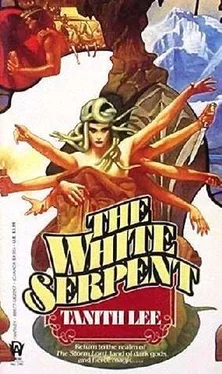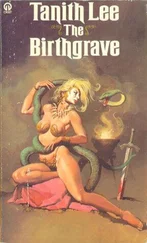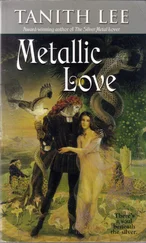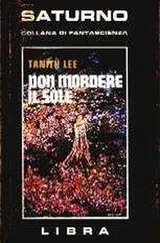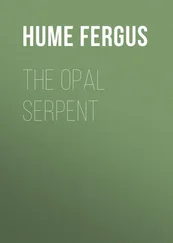Into herself Aztira accepted Ashnesee, the voluntary conception of a child.
The idea had a symmetry not one of her race could deny.
The very name itself, worked a magic within her, like the melody of that sleeping sea she had also only heard of. It was the true name of the oldest city of her kind—Ashnesea—the rusted blade left lying south of south on the Plains.
Slaves of the Vis race had been herded to the building of this reincarnation of Ashnesee. It lay innermost in the thick fur of the dark beast’s back, the jungles of the northern west. And close to malignant hating Zakoris. Yet further particles of Balance.
To Ashnesee then, would Aztira go? It was offered to her as a quest at the moment her youth itself might have been craving one.
For Ashnesee was to be sought. As, long ago, some had sought Ashnesea.
A month later, Aztira left by the north gate of her city, alone and on foot, which was how the Amanackire mostly traveled.
In Xarabiss, she was stared at. It was summer, and there were crimson flowers on the land like a daylong sunset. The peasants came to offer her fruit or bread, little basins of broth or wine, with a garland arranged at the brim. (What she required, she accepted.) In the cities they made way for her, soldiers pushing the crowds aside. At hostelries and inns, the best chamber was at once allocated, but as a rule she chose the open, where they would place an awning on a roof or in a garden. She was never disturbed. The busy, loud-clashing crystal cities of Xarabiss passed as if on wheels. They were none of them her city of the Plains.
In the narrow land of Ommos, in theory a Lowland possession, if not much cherished and barely kept, the journeying girl elicited terror and aversion. In the towns, no one would look at her, they skulked or ran away. Ommos itself was considered ugly Vis-over. Coming on a party of mixes on a shore, she took passage in their ship to Dorthar.
Dorthar she did not amaze.
At the first town she was greeted with ceremony and gifts, and refused them. Unshaken, they offered her the use of a traveling chariot, chariot-animals, and a driver bowing to the street. She had come all that distance a pedestrian, preferring it, undaunted, having no need for the security of wagon or servant, her physical vivacity, that looked so fragile, stronger than the strength of a healthy man. But she did assume the chariot for a little of the journey. She was curious to see the city of Anackyra.
Again, on the open road (now a paved highway), a delegation accosted the Amanackire. Men in gold trim and heavy ornaments who asked, under their goddess-banners, if she desired escort, who inquired if she wished to meet with the Storm Lord—he would, they promised, receive her with pomp. She put them right, there. She had no interest in their High King, the mixed-blood bastard descendant of Raldnor, and though she did not speak of it in that way, that was the way they took it from her, without a flicker or a risen brow.
Under a dragon comb of mountains, Anackyra demonstrated streets of hammered marble, many Anackire temples of bare-breasted golden harlots, bleached-hair Dortharians, prosperous Vathcrians, and tall, brazen Vis.
Having to address her, from the princes in their chariots to scrabbling rabble by the gutters, it was with the title Priestess, but now and then. Goddess.
She lived a year in Dorthar, up in the hills between Anackyra and the ruins of ancient Koramvis. A lord had made over a villa to her, the nobility had been jostling to do it. Mix slaves waited on her. Tame pigeons nested in the feather trees, but the kennel of hunting kalinx the lord had removed—the Amanackire Goddess had no inclination to venery.
If any white Amanackire were her neighbors in these regions, they did not reveal themselves, and were not spoken of.
There was an importance to Dorthar, and to the dissimilar twin cities—the ruin above, the rebirth below. One adjourned here, to absorb the psychic smolder, or to pay some obscure respect to it.
This spot was a well of Power, deep and unstable as the earthquake-faulted strata of the land.
Aztira compared it to the being of the other spot, the gamepiece of the Amanackire, which by then, like a tiny muffled light, was a beacon in her brain. Ashnesee had been erected solely upon ground. There was no reservoir of mystic and violent energy beneath. In itself, that was significant enough.
All this time, the time of traveling and resting, no part of Aztira had faltered. None of her beliefs was shaken or changed. These mortal Vis were alien, and interested her less than their monuments. Fearing nothing, knowing herself mightier, and awarded everywhere homage, she did not query her supremacy. And when she glanced inwardly toward the beacon of the City of the West, it did not trouble her any more than the sea and the forests which coiled it round.
After that year of pause breathing in the airs of Dorthar, Aztira traveled again. She went down the coast in the other direction, south by ship from Thos, and crossed to Shansarian Ahsaar. (She found Shansarian reverence like that of other countries, and their unease also quite comparable.)
She was approaching the age of nineteen, in Sh’alis, when the slow mental breakers from the west altered their tempo.
Her leisurely meandering was leading her always to Ashnesee, and thus in a manner Ashnesee had already claimed her. She was only a filament straying from and to the kernel of its thought and plan. Otherwise, having no necessity to reach outward, she had fed her eyes and ears, her moods, but never explored analytically anything of the real and ordinary life of mankind which everywhere fermented. Yet suddenly, for no apparent reason, as if she had put her hand upon a pulse in the body of some statue—she felt the genuine aliveness of the world and of its mass of peoples, surging and whirling on every side. And only then she learned how Ashnesee had also felt this surge and whirl.
Like a beast rousing from fathomless sleep, Ashnesee had lifted its lids and distended its nostrils—
The white serpent, waking. ... As Aztira sensed the terrible invading threat of living mass pulsing, boiling against her, Ashnesee long ago had sensed it. And Ashnesee the serpent was gathering itself.
For the first hour in all her days, Aztira was overcome by a featureless, awful doubt. She did not see what it was, for it was so unusual.
In the burning starlit nights of northern Alisaar, the goddess-girl, unable to compose herself for sleep, paced up and down the courts and passages of a house some Shansarian aristocrat had given her. Her own instinct, feeling the ambivalent clutch of external life, was to thrust it off, trample it. The woken instinct of Ashnesee was like her own.
The sword-snake yearned to strike a warning, warding blow.
As she comprehended her own skin on her bones, the flowing hair that clothed her head, so with Ashnesee, now.
What Ashnesee willed, she must will, for the will was corporate, indivisible.
Linked with this power, some sensation never before experienced entered her marrow. It was both physical and spiritual. It had no name, but it shamed her, and this led her at length to suppose it was, itself, shame.
A Shansar prince with Karmian graces, who had religiously sent her wines and flowers and jewels, was going down to the south, to vaunting “Tree” Alisaar. A chariot race, famous and notorious, drew him there. Most of his Shalian household would go with him, and quantities of horses.
Aztira informed the man, Kuzarl, she would travel with him but without display. Falling on his knees, he told her such a commission was an honor.
She did not know why impulse drove her south, to Saardsinmey, a city by the ocean. Infallibly, her psychic’s prescience thrust her forward. She obeyed herself, for in the past she had always been able to rely on what she was.
Читать дальше
